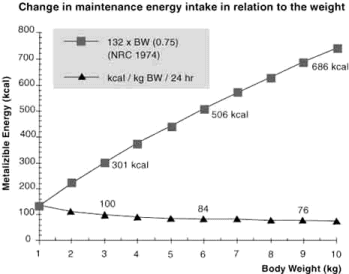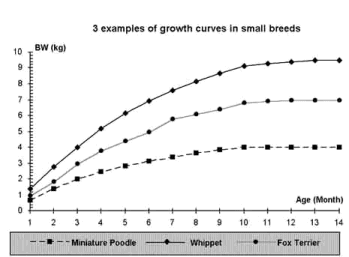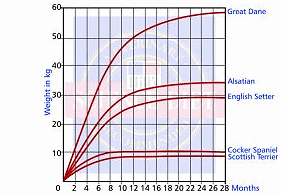GROWTH OF SMALL BREED PUPPIES
Small breed puppies grow rapidly. Most of the growth takes place within the first six months, a date on which they often reach their sexual maturity. On average, a puppy has already nutritional requirements twice as important as an adult dog: in the case of small breed puppies, particularly precocious, the diet shall provide enough protein and fat to supply the energy necessary for their fast development. They also require intakes of minerals and vitamins suited to their requirements to ensure a good ossification of the skeleton.
It is at weaning that their growth is at the most intense: the birth weight is multiplied tenfold within 7-8 weeks. From 3-4 months, puppies will enter into a period of slower growth. During his growth, a Yorkshire multiplies his birth weight only twenty-five times while a Saint Bernard multiplies his one hundred times.
Small breed dogs are little affected by bone development problems during growth. These puppies are not very demanding as regards the mineral intake: it is perfectly pointless to add calcium to their daily ration of complete food.

From Queinnec 1996
Training the dietary behaviour implies a firm attitude from weaning. Good habits must be established from the outset. In small breeds, overeating during growth promotes the multiplication of fat-storing cells: indeed, development of the adipose tissue starts a little after weaning. A puppy showing excess weight during growth is 50% more likely to suffer from obesity at adulthood compared with a puppy with a normal weight.
It is often considered that growth in small breed dogs is completed from 10 to 12 months of age. At that age, one will opt for an adult food for small dogs. Too often, a small breed adult dog continues to be fed like a puppy, which is a nutritional aberration: puppy foods are generally too rich in fat, in protein, and in calcium to stand as an optimum answer for an adult dog in the long term.
Energy Requirements of Small Breed Adult Dogs
Small-sized adult dogs have basic energy requirements which are proportionately higher than large-sized dogs: a 3-kg Yorkshire needs about 100 kcal per kg, while a 60-kg Newfoundland will require under 50 kcal/kg. Moreover, small dogs are often spontaneously very active dogs: therefore they require an increased energy intake compared with the generally calmer large breeds.
Weekly weighing makes it possible to adapt the individual ration to the change in weight. Variations of more or less 20% in relation to the recommendations listed on the package are not uncommon.

It is best not to trust the dog with regulating his food consumption himself according to his requirements. Loneliness, boredom, food palatability, distribution of
titbits are so many factors interfering with his behaviour. The habit of giving meal leftovers has significantly more important consequences in small breeds than in others. In miniature breeds, table leftovers account for 50% of the daily calorie intake on average. For instance, 25g of Swiss cheese provide about 100 kcal, i.e. the third of the daily calorie intake of a 3-kg dog...
While offering sufficient energy density to meet the high requirements of small dogs, the diet must include
a moderate quantity of fat. The fact is that excess food is more easily stored in the adipose tissue if the energy is provided by fat rather than by protein and carbohydrates.
From the Aniwa
Encyclopaedia
|
![]()



